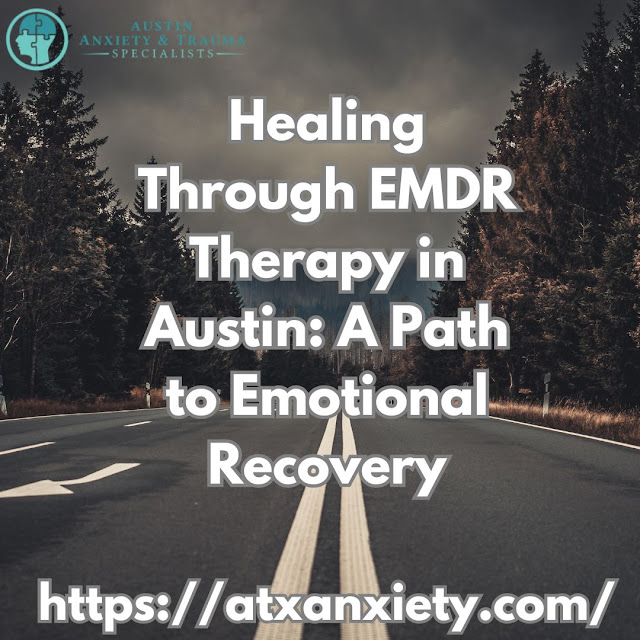Healing Through EMDR Therapy in Austin: A Path to Emotional Recovery
In the vibrant and diverse city of Austin, Texas, individuals grappling with traumatic experiences or emotional challenges have found hope and healing through Eye Movement Desensitization and Reprocessing (EMDR) therapy. This innovative therapeutic approach has gained recognition for its effectiveness in treating a wide range of psychological issues. In this blog post, we'll explore EMDR therapy in Austin, its principles, the conditions it can address, and how it has become a beacon of healing for many residents.
The Core Principles of EMDR Therapy
1.
Processing
Traumatic Memories: EMDR therapy
focuses on processing traumatic memories that contribute to emotional distress.
These memories often remain unprocessed and can lead to symptoms such as
anxiety, depression, and post-traumatic stress disorder (PTSD).
2.
Bilateral
Stimulation: A unique aspect of EMDR therapy is
bilateral stimulation, which can involve eye movements, taps, or sounds. This
bilateral stimulation is believed to help the brain reprocess distressing
memories, reducing their emotional charge.
3.
Desensitization and
Reprocessing: EMDR therapy aims to desensitize
individuals to distressing memories and reprocess them into more adaptive, less
distressing forms. This process helps individuals gain emotional relief and a
sense of control.
4.
Cognitive
Restructuring: EMDR therapy also incorporates
cognitive restructuring, helping individuals identify and replace negative
beliefs with more positive and adaptive ones.
Conditions Treated with EMDR Therapy in Austin
1.
Post-Traumatic
Stress Disorder (PTSD): EMDR therapy is
particularly effective in treating PTSD. It can help individuals process
traumatic memories, reduce flashbacks, and alleviate the distressing symptoms
associated with trauma.
2.
Anxiety Disorders: EMDR therapy has been successful in treating various anxiety
disorders, including generalized anxiety disorder (GAD), social anxiety
disorder, and specific phobias.
3.
Depression: For individuals struggling with depression, depressiontreatment in Austin can help address underlying traumatic experiences
or negative beliefs that contribute to their depressive symptoms.
4.
Substance Abuse and
Addiction: EMDR therapy is sometimes used as
part of addiction treatment to address the underlying trauma that may have
contributed to substance abuse.
5.
Panic Disorders: Individuals with panic disorders can benefit from EMDR therapy by
processing the distressing events that trigger panic attacks.
6.
Grief and Loss: EMDR therapy can aid individuals in processing grief and loss,
allowing them to move through the stages of mourning and find a sense of
closure.
EMDR therapy in Austin has emerged as
a beacon of hope for individuals seeking relief from traumatic experiences,
anxiety, depression, and various other emotional challenges. Its innovative
approach, rooted in the principles of memory reprocessing and desensitization,
has paved the way for profound healing experiences. If you or someone you know
is struggling with emotional distress or psychological conditions, consider
exploring EMDR therapy as a powerful and effective means of healing and
recovery in the vibrant city of Austin, Texas.
Finding Calm in the Live Music Capital by Generalized Anxiety Disorder
Treatment in Austin
In the lively and diverse city of
Austin, Texas, many individuals grapple with the challenges of generalized
anxiety disorder (GAD). Fortunately, Austin offers a range of resources and
treatment options to help those living with GAD find relief and regain control
over their lives. Learn the treatment options available for generalizedanxiety disorder treatment in Austin, emphasizing the importance of seeking
professional help and support.
Understanding Generalized Anxiety Disorder (GAD)
Generalized Anxiety Disorder (GAD) is
a mental health condition characterized by excessive and uncontrollable worry
and anxiety about everyday life events, often for no apparent reason. People
with GAD may experience physical symptoms such as restlessness, muscle tension,
fatigue, and irritability.
Treatment Options for GAD in Austin
In some cases, medication may be
prescribed to manage the symptoms of GAD. Austin has numerous psychiatrists and
healthcare providers who can assess your specific needs and prescribe
appropriate medications.
2.
Mindfulness and
Relaxation Techniques:
Many professionals in Austin offer
mindfulness-based therapies, such as Mindfulness-Based Stress Reduction (MBSR)
and yoga, which can help individuals manage anxiety through mindfulness and
relaxation exercises.
3.
Support Groups:
Support groups can provide a sense of
community and understanding for those with GAD. Austin hosts various support
groups where individuals can share their experiences and coping strategies.
4.
Lifestyle
Modifications:
Austin's outdoor-oriented culture
offers opportunities for physical activity and stress reduction. Regular
exercise, a balanced diet, and adequate sleep are crucial in managing anxiety.
5.
Holistic
Approaches:
Austin is known for its holistic and
alternative health practices. Some individuals find relief from GAD through
techniques such as acupuncture, herbal remedies, and massage therapy.
6.
Teletherapy
Services:
Many panic disorder
treatments in Austin offer teletherapy services, providing access to
mental health care from the comfort of your home.
The Importance of Seeking Help
If you or someone you know is
struggling with generalized anxiety disorder, seeking professional help is
essential. GAD is a treatable condition, and with the right guidance and
support, individuals can learn to manage their anxiety and lead fulfilling
lives. Early intervention can prevent GAD from worsening and leading to
additional mental health challenges.
Final Words
Living with generalized anxiety
disorder can be challenging, but in Austin, a city known for its vibrant
culture and wellness-focused community, help and support are readily available.
Whether you choose psychotherapy, medication, or a combination of approaches,
there are numerous resources in Austin to help you or your loved one find
relief from GAD and embark on a path to emotional well-being. Remember, you are
not alone in your journey, and seeking treatment is a courageous and important
step toward a calmer, more fulfilling life in the Live Music Capital of the
World.



Comments
Post a Comment